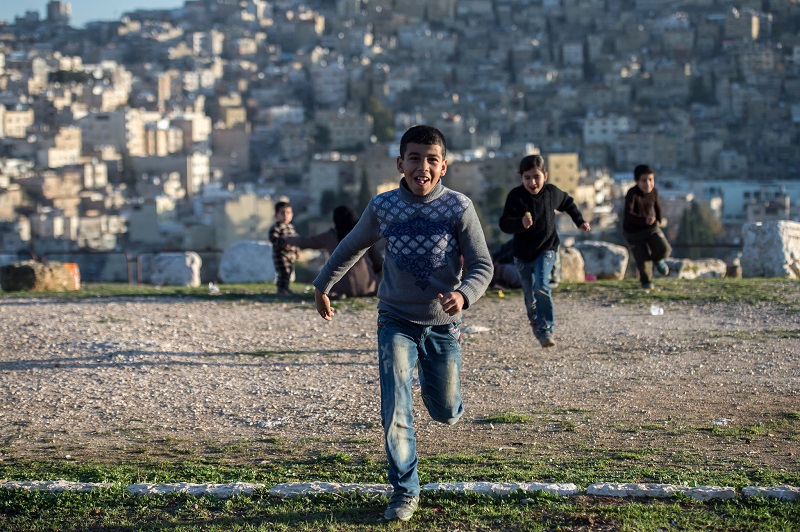Bishops from across Europe, North America and South Africa who make up this year’s Holy Land Coordination group have shared their final message at the close of their pilgrimage to the Holy Land. In their message, bishops shared their ‘hope for a better future’ for the young people in the region. Bishop Donal McKeown, Bishop of Derry, represented the Irish Bishops’ Conference on this year’s pilgrimage.
The focus of this year’s pilgrimage was on education and young Palestinian and Israeli people. Bishops took part in a series of meetings and visits to promote the value of education for young people and the importance education has in building peace in the Holy Land region.
In their message, the Holy Land Coordination group bishops said, ‘We have come to the Holy Land to meet its youth, listen to their voices, and pray for justice and peace. Despite the continuing destructive conflict and the divisive approach of so many in power, our faith in God gives hope for the better future sought by young people here. Over the past week we have witnessed and heard of their struggle to build this dream.
‘Young people in Gaza continue to be robbed of their life chances by the enduring blockade, which indiscriminately denies them the opportunity to flourish. Young people in the West Bank continue to suffer violations of their dignity on a daily basis, which have become unacceptably normalised by occupation.
‘Young lives throughout the Palestinian Territories are blighted by unemployment. Pope Francis has consistently decried unemployment as one of the greatest barriers preventing today’s youth from reaching their full potential.
The bishops continued, ‘Many of the young Israelis we met in schools and universities recognise they are living in the shadow of a conflict that they did not create and do not want. We listened to young people from all sides who share the same aspirations for peaceful coexistence, yet are facing completely different realities, with few opportunities to ever meet or understand each other’s hopes and fears.
‘For a whole generation the prospect of peace has been made even more remote by morally and legally unacceptable decisions – in particular the recent affront to the internationally recognised status of Jerusalem, a city sacred to Jews, Christians and Muslims.
‘The young people of the Holy Land have been consistently failed by both their own leaders and the international community. The anger that we witnessed is entirely justified – it is also a sign that they retain the conviction to strive for change.
The bishops went on to say, ‘Throughout the West Bank, Gaza and Israel the youth are keeping hope alive through their resilience and courage. The local Christian community, though small in number, is an integral part of this, not only through the contribution of its own youth, but also through its service to all young people.
It is young people who are daring to pursue justice and challenge the divisions that have been forced upon them. It is schools and youth projects that are breaking down barriers and equipping people to build tolerance. It is young volunteers, such as those working with L’Arche in Bethlehem, Beit Emmaus in Qubeibeh, and religious orders in Gaza, who are demonstrating humanity in this wounded society.
The message concluded, ‘We share the hope of those young people we met in the Holy Land and recognise their essential role in promoting peace. They have helped us to see hard realities through their eyes. And so we call on our communities at home to act in solidarity with them:
– through supporting organisations which help to create jobs, provide housing, and facilitate dialogue;
– through prayer and making pilgrimages which encounter and support local people;
– and through standing resolutely against all those who seek to create further division, especially among our own political leadership.
Above all we hold the young people here in our prayers and inspired by Pope Francis commit ourselves, with the help of God’s grace, to play our part in making this land more human and more worthy for the youth of today and the future.’
The following bishops took part in the Holy Land Co-ordination:
Bishop Declan Lang (Clifton, England and Wales – Co-ordinator)
Bishop Lionel Gendron (Saint-Jean Longueuil, Canada)
Bishop Udo Bentz (Mainz, Germany)
Archbishop Riccardo Fontana (Arezzo-Cortona-Sansepolcro, Italy)
Bishop Donal McKeown (Derry, Ireland)
Bishop Pierre Bürcher (Iceland)
Bishop Mgr José Ornela Carvalho (Setubal, Portugal)
Bishop William Kenney (Birmingham, England and Wales)
Bishop Nicholas Hudson (Westminster, England and Wales)
Bishop Christopher Chessun (Church of England, United Kingdom)
Bishop William Nolan (Galloway, Scotland)
Archbishop Joan-Enric Vives Sicilia (Urgell, Spain)
Archbishop Mgr Stephen Brislin (Cape Town, South Africa)
Bishop Mgr Dr. Felix Gmür (Basel, Switzerland)
Bishop Oscar Cantu (La Cruces, USA)
The Holy Land co-ordination pilgrimage is organised by the Bishops’ Conference of England and Wales. This annual visit was set up 20 years ago at the invitation of the Holy See with the aim of visiting and supporting the Holy Land’s local Christian communities as they experience the political and socio-economic realities of living in Israel and Palestine. The Co-ordination’s raison d’être can be expressed through the ‘3 Ps’: Prayer, Pilgrimage, Persuasion.


